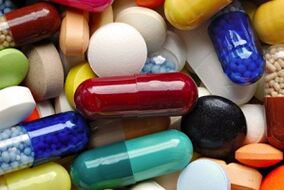The inflammatory process in the prostate is typical of adult men after 40 years. This pathology is caused by various hormonal, viral or bacterial disorders, weakened immune defenses, genitourinary and genital diseases, prolonged absence of sexual intercourse. Treatment usually does not pose a problem, as the pharmaceutical market offers many modern drugs that are effective in overcoming prostatitis. Only a qualified urologist decides which prostatitis medication a particular patient should take.

Forms of medication used for prostatitis
Medications prescribed for the treatment of prostatitis are available in the form of tablets, suppositories, injectors, injections or microclycerers. Tablet preparations are usually indicated by antibiotics with a fairly broad spectrum of action, which are prescribed in cases where the causative agent of the pathology has not been identified. In general, antibiotics are represented by three groups of drugs:
- Fluoroquinols.
- Penicillin.
- Tetracyclines.
Often in the treatment of prostatitis, suppositories are used that are applied rectally (they are inserted into the anus). Such drugs are effective in relieving pain and have antibacterial effects. The greatest penetration into body tissues is distinguished by injectable solutions. They have systemic effects, stimulate the immune system and vascular system.
According to experts, the maximum therapeutic effectiveness is achieved with the method of rectal administration, therefore it is preferred over other methods of treating prostatitis.
It is not uncommon for the treatment of prostatitis to include an implantation procedure, when the drug is injected directly into the urethral canal to the patient. Before giving the solution, a man needs to empty his bladder. In one procedure, no more than 5 ml of solution is injected. Primary therapy can be complemented by folk remedies such as microclysters, in which the cure for prostatitis is presented in the form of herbal ingredients or infusions. The micro-enema technique is based on complex temperature-medical effects. Such treatment must be performed before bedtime, because after microclycerin, hypothermia or prostate overtrain is unacceptable.
Group of pharmacological drugs for prostatitis

Treatment of prostatitis is always complicated, including the use of drugs from various pharmacological groups: antibiotics, painkillers, α blockers, muscle relaxants and drugs containing hormones, antiviral and anti-inflammatory, as well as phytotherapeutic agents, etc. With prostatitis of bacterial etiology, antibiotics are the basis of therapy. Treatment with tablet antibiotics is usually prescribed for chronic and acute bacterial prostatitis and lasts about a month. If there are complications of prostatitis, treatment is done by injecting drugs. If the causative agent of the infection cannot be identified, then combination antibiotic therapy is performed.
Anesthetic drugs greatly facilitate the course of prostatitis, but they must be taken as directed, because uncontrolled intake of analgesics can give rise to the appearance of very undesirable side effects. The use of α-blockers is due to the relaxing effects of these drugs on the muscles and neck of the bladder, which significantly reduces the pain associated with urination. But these drugs cause side effects such as hypotension or headaches. Similar drugs are prescribed for chronic prostatitis of non -bacterial etiology.
Often, the body of men with prostatitis needs to restore and strengthen the immune defenses, which are aided by drugs from the group of immunomodulators, which include interferon and other drugs.
Used in the treatment of prostatitis and muscle relaxation, which reduces the tone of the muscles located in the perineum. The use of such drugs is due to the tension of these muscles which causes discomfort and pain. The use of hormone-containing drugs in treatment is due to the need to lower testosterone levels, which provokes the proliferation of the prostate gland. As a result of hormone therapy, the intensity of the inflammatory process decreases and the hormonal background is normalized. Sometimes, as an adjunct treatment for prostatitis, herbal preparations are used to relieve swelling, inflammation and pain. Herbal remedies are often used in the treatment of chronic forms of prostate inflammation.
In cases of prostatitis of viral etiology, the use of antiviral agents is indicated. Therapy is often complemented by non-steroidal anti-inflammatory drugs. The action of such drugs is aimed at relieving pain and swelling, high temperature, which accompany the inflammatory process in the prostate. Suppositories containing nonsteroidal anti-inflammatory substances are very effective. Drug therapy often involves the use of drugs that increase blood flow to the prostate.
There are many effective agents for the treatment of inflammation of the prostate gland, but they cannot be prescribed independently, although there are no contraindications at all.
























